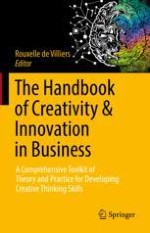2022 | OriginalPaper | Buchkapitel
9. Creative Thinking: Designed for Humans
verfasst von : Mark Kilgour
Erschienen in: The Handbook of Creativity & Innovation in Business
Verlag: Springer Nature Singapore
Aktivieren Sie unsere intelligente Suche, um passende Fachinhalte oder Patente zu finden.
Wählen Sie Textabschnitte aus um mit Künstlicher Intelligenz passenden Patente zu finden. powered by
Markieren Sie Textabschnitte, um KI-gestützt weitere passende Inhalte zu finden. powered by
